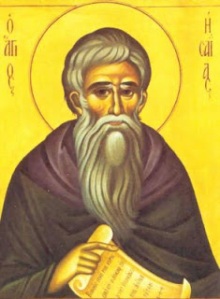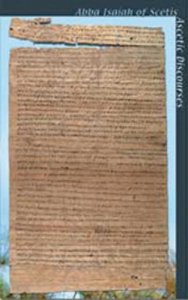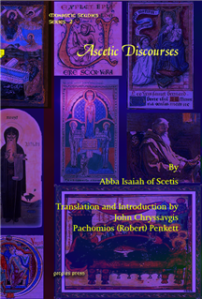The “Asceticon” of Abba Isaiah of Scetes
The “Asceticon” (“ascetic discourses”) by Abba Isaiah of Scetes is a diverse anthology of essays by an Egyptian Christian monk who left Scetes around 450 AD.

Originally composed in Greek, the “Asceticon” consists of 30 essays (“logos”) on subjects including: advice for novice monks; precepts for those who have renounced the world; sayings and stories by Abba Isaiah; various letters, sermons, and sayings. Logos 30 includes several sayings that were also included in the “Apophthegmata Patrum” (“Sayings of the Desert Fathers”), but in a different form, giving scholars some evidence on how those sayings evolved into their final form in the “Apophthegmata Patrum”. Abba Isaiah was also influential in bringing Christianity to Palestine.
http://en.wikipedia.org/wiki/Asceticon
“Little is known about the period that Abba Isaiah spent in his native land, as a recluse in the desert of Scetis. His fame began to grow beyond the borders of Egypt only after he settled in a monastery near Gaza and befriended Peter the Iberian, the head of the anti-Chalcedonian resistance in Palestine. The figure of Isaiah was soon appropriated by some “Monophysite” authors like John Rufus and Zachariah Rhetor, who described him in the company of the opponents of the Council of Chalcedon.
The “Asceticon” of Abba Isaiah contains a series of ascetic precepts for those who want to avoid the dangers of solitary life. The transmission history of the Isaian corpus is complex, as attested by the various forms in which is preserved. Unfortunately, a proper edition of the Greek original is still lacking. The project initiated by Herman Dörries in Götingen, which was supposed to offer the first critical edition of the “Asceticon”, did not bear fruit. The Greek text is available only in Augustinos Iordanites’ publication of an incomplete 18th century Greek manuscript. Derwas Chitty collated Augustinos’ text with the Bodleian manuscript Cromwell 14 and, according to the report, his transcription is deposed in the library of the House of St Gregory and St Macrina, Oxford. Besides, two Greek papyrus fragments containing small portions of the “Asceticon” were published.
In 1956, Antoine Guillaumont edited the logoi of Abba Isaiah after several fragmentary Sahidic manuscripts. As for Arabic, Joseph-Marie Sauget identified and published a cluster of fragments in the Vatican library, while Victor Arras edited few bits that survived in Ethiopic.
It was only in 1968 that the complete text of the “Asceticon” became largely available for scholarly research due to René Draguet’s edition and translation of the Syriac version. Besides providing a detailed survey of the textual transmission of the Asceticon in Syriac, Draguet was the first to use a larger number of Greek manuscripts, often giving in parallel columns the Syriac translation and his own collation of the Greek text.
We also have knowledge of some Armenian and Georgian fragments of the “Asceticon”. Finally, a Sogdian translation of the brief piece entitled “On humility” was found by the German archeologists at the ruins of a Nestorian monastery in the Turfan oasis.
All these textual evidences show that the “Asceticon” was a bonum communis, being appropriated, at the same time, by the Chalcedonians, “Monophysites,” and even Nestorians.
Although the Sahidic version of the “Asceticon” is attested by a good number of fragments, no Bohairic manuscript has been announced yet. The only surviving witness in this dialect is thought to be a quotation which occurs in a catena on the four Gospels. The fragment in question was published recently by Youhanna Nessim Youssef, who assumed that a Bohairic version of the “Asceticon” must have existed: “[i]l est vraisemblable qu’une collection Copte Bohaïrique de l’Asceticon d’Isaïe existait en plus de ce qui est connue de la version Sahidique.”
I should like to mention here that, although not yet identified, several such Bohairic fragments of the “Asceticon” were published already in 1926 by Hugh G. Evelyn White in his “Monasteries of the Wadi ’N Natrun”. Thus, four out of seven parchment fragments edited by Evelyn White under the heading “Monastica,” belong precisely to the Logoi of Abba Isaiah. Their original provenance is the Monastery of St. Macarius in Wadi ’N Natrun, our main source of early Bohairic manuscripts.”
From Alin Suciu “The Dossier of the Asceticon of Abba Isaiah: With a Contribution on the First Bohairic Fragments” (2011) at http://alinsuciu.com/2011/04/21/the-dossier-of-the-asceticon-of-abba-isaiah-with-a-contribution-on-the-first-bohairic-fragments/ Comprehensive endnotes not included but available in the on-line original.
For the text of the Asceticon of Abba Isaiah in English translation, see:

John Chryssavgis (Translator) and Pachomios (Robert) Penkett (Translator) “Abba Isaiah Of Scetis: Ascetic Discourses” [Cistercian Studies Book 150, Cistercian Publications, 2001] – available in pdf at: http://suciualin.files.wordpress.com/2012/10/abba-isaia-eng-2002.pdf
and in a different edition:

John Chryssavgis (Translator) and Pachomios (Robert) Penkett (Translator) “Abba Isaiah Of Scetis: Ascetic Discourses” [Gorgias Press & Cistercian Publications, 2009].
Contents
• Rules for the Brothers who Live with Him (page 41)
• On the Natural State of the Intellect (page 45)
• On the Condition of Beginners and Anchorites (page 49)
• On the Conscience of Those who Stay in Their Cells (page 55)
• Faithful Commandments for the Edification of Those who Wish to Live Peacefully Together (page 71)
• On Those who Desire to Lead a Life of Good Silence that They May Take Care to Reject Those who Rob Their Soul, so as Not to Waste Their Time in Captivity and Bitter Slavery, for They Convince Their Heart to Do Improper Things and Forget Their Sins (page 79)
• On Virtues (page 83)
• Sayings (page 89)
• Commands for Those who have Renounced (page 97)
• Another Discourse (page 101)
• On the Grain of Mustard Seed (page 103)
• On Wine (page 105)
• On Those who have Struggled and Reached Perfection (page 107)
• Acts of Mourning (page 113)
• On Detachment (page 117)
• On the Joy that Comes to the Soul that Desires to Serve God (page 121)
• On Thoughts about Renunciation and Exile (page 133)
• On Forgiveness (page 141)
• On Passions (page 145)
• On Humility (page 149)
• On Repentance (page 151)
• On the Conduct of the New Person (page 165)
• On Perfection (page 175)
• On Tranquillity (page 183)
• To Abba Peter, His Disciple (page 185)
• Recorded by Isaiah’s Disciple, Abba Peter, who had Heard it Spoken by his Master (page 213)
• In which he says, ‘Attend Diligently’ (page 221)
• The Branches of Malice (page 229)
• Lamentations (page 237)
Leave a comment